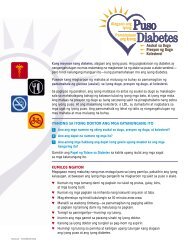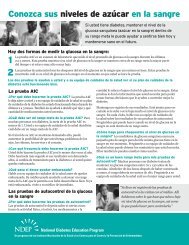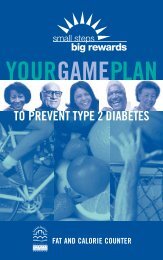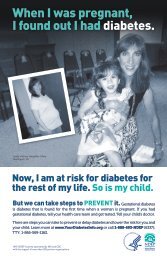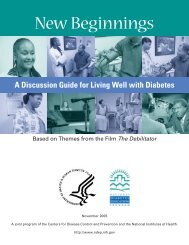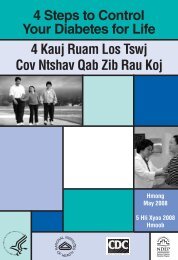- Page 1 and 2:
Power to Prevent A Family Lifestyle
- Page 3 and 4:
Credits and Acknowledgments NDEP Af
- Page 5 and 6:
Table of Contents Foreword. . . . .
- Page 7 and 8:
Appendix Materials and Resources Th
- Page 9 and 10:
Additional Resources for Program Le
- Page 11 and 12:
Organizations Black Women’s Healt
- Page 13 and 14:
in the Forward/Introduction section
- Page 15 and 16:
NDEP GAME PLAN Food and Activity Tr
- Page 17 and 18:
Session No. and Title Session 10 Pa
- Page 19 and 20:
Session Duration Each session is de
- Page 21 and 22:
Session Preparation As program lead
- Page 23 and 24:
Refreshments and healthful snacks,
- Page 25 and 26:
Conducting the Session NOTE: Times
- Page 27 and 28:
Say: “Let’s fll in our Individu
- Page 29 and 30:
The program leader ends the session
- Page 31 and 32:
NOTE: You could choose other sticke
- Page 33 and 34:
NDEP Power to Prevent Program Leade
- Page 35 and 36:
Getting Started Getting started wit
- Page 37 and 38:
NDEP Power to Prevent Program Leade
- Page 39 and 40:
Key to Icons Used in Power To Preve
- Page 41 and 42:
At least two helpers to assist peop
- Page 43 and 44:
Say: “The objectives for today’
- Page 45 and 46:
What are some of the Complications
- Page 47 and 48:
Pledge Possible Improvements I’ll
- Page 49 and 50:
NDEP Power to Prevent Session 0
- Page 51 and 52:
Purchase stickers (stars, smiling f
- Page 53 and 54:
Discussion Points Say: “Small Ste
- Page 55 and 56:
Preparation and Reminders for the N
- Page 57 and 58:
Advance Preparation NOTE: The NDEP
- Page 59 and 60:
Discussion Points Say: “Healthy e
- Page 61 and 62:
Activity Take a 5- to 0-minute brea
- Page 63 and 64:
Tips for Inviting a Registered Diet
- Page 65 and 66:
NDEP Power to Prevent Session 3 0
- Page 67 and 68:
Appendix U: Why Physical Activity I
- Page 69 and 70:
in silence. Suggest that if partici
- Page 71 and 72:
Ask participants to name ways that
- Page 73 and 74:
Optional Activities 4.1 Visit an At
- Page 75 and 76:
also be downloaded from the NDEP We
- Page 77 and 78:
Say: “Cooking can be a fun activi
- Page 79 and 80:
NDEP Power to Prevent Session 5 6
- Page 81 and 82:
Brochure 7 Principles for Controlli
- Page 83 and 84:
Conducting the Session Welcome Welc
- Page 85 and 86:
List answers on a fipchart, and mak
- Page 87 and 88:
NDEP Power to Prevent Session 6 8
- Page 89 and 90:
Conducting the Session Welcome Welc
- Page 91 and 92:
Activity Take a 5- to 0-minute brea
- Page 93 and 94:
Advance Preparation In addition to
- Page 95 and 96:
Further Information on Diabetes Pre
- Page 97 and 98:
NDEP Power to Prevent Session 6 8
- Page 99 and 100:
Obtain copies of Appendix Q: Energi
- Page 101 and 102:
Review of Discussion Points Say:
- Page 103 and 104:
NDEP Power to Prevent Session 7 6
- Page 105 and 106:
Advance Preparation In addition to
- Page 107 and 108:
My Pyramid Some people in your grou
- Page 109 and 110:
NDEP Power to Prevent Session 8 6
- Page 111 and 112:
Bring copies of menus from several
- Page 113 and 114:
Example of better “I statement”
- Page 115 and 116:
NDEP Power to Prevent Session 9 6
- Page 117 and 118:
If you plan do to the Optional Acti
- Page 119 and 120:
It is recommended that people with
- Page 121 and 122:
Optional Activities 1.1 Review the
- Page 123 and 124:
Advance Preparation In addition to
- Page 125 and 126:
Discussion Points Say: “Making ch
- Page 127 and 128:
Pledge Have participants make an in
- Page 129 and 130:
Advance Preparation for Session 12
- Page 131 and 132:
Make photocopies of the Post-progra
- Page 133 and 134:
Review of Discussion Points Say:
- Page 135 and 136:
NDEP Power to Prevent Session 2 6
- Page 137 and 138:
NDEP Power to Prevent Appendices 2
- Page 139 and 140:
Sample Letter to Potential Partners
- Page 141 and 142:
NDEP Power to Prevent Appendices 6
- Page 143 and 144:
NDEP Power to Prevent Appendices 8
- Page 145 and 146:
NDEP Power to Prevent Appendices 0
- Page 147 and 148:
Black Women’s Health Imperative w
- Page 149 and 150:
NDEP Power to Prevent Appendices 4
- Page 151 and 152:
Community newspaper organizations S
- Page 153 and 154:
Selecting and Securing a Regular Me
- Page 155 and 156:
Reward participants for fnishing th
- Page 157 and 158:
People bring their children to the
- Page 159 and 160:
NDEP Power to Prevent Appendices 24
- Page 161 and 162:
“I can accept failure. Everyone f
- Page 163 and 164:
NDEP Power to Prevent Appendices 28
- Page 165 and 166:
NDEP Power to Prevent Appendices 30
- Page 167 and 168:
NDEP Power to Prevent Appendices 32
- Page 169 and 170:
NDEP Power to Prevent Appendices 34
- Page 171 and 172: Session Questionnaire Intent 1 Pre-
- Page 173 and 174: Where Am I Right Now? Thinking abou
- Page 175 and 176: The next questionnaire is an option
- Page 177 and 178: Feelings About Having Diabetes Plea
- Page 179 and 180: Pre-Session 3 Questionnaire (Fill o
- Page 181 and 182: Post-Session 3 Questionnaire (Fill
- Page 183 and 184: Pre-Session 4 Questionnaire (Fill o
- Page 185 and 186: Post-Session 5 Questionnaire (Fill
- Page 187 and 188: Please answer the following. (Check
- Page 189 and 190: Check Ups Please check “Yes” or
- Page 191 and 192: How confdent are you now? Please ci
- Page 193 and 194: Post-Session 11 Questionnaire (Fill
- Page 195 and 196: Where Am I Right Now? Thinking abou
- Page 197 and 198: NDEP Power to Prevent Appendices 62
- Page 199 and 200: 1 Start Here 2 Check Calories 3 Lim
- Page 201 and 202: NDEP Power to Prevent Appendices 66
- Page 203 and 204: NDEP Power to Prevent Appendices 68
- Page 205 and 206: NDEP Power to Prevent Appendices 70
- Page 207 and 208: NDEP Power to Prevent Appendices 72
- Page 209 and 210: NDEP Power to Prevent Appendices 74
- Page 211 and 212: NDEP Power to Prevent Appendices 76
- Page 213 and 214: The Plate Method The Plate Method c
- Page 215 and 216: NDEP Power to Prevent Appendices 80
- Page 217 and 218: NDEP Power to Prevent Appendices 82
- Page 219 and 220: NDEP Power to Prevent Appendices 84
- Page 221: NDEP Power to Prevent Appendices 86
- Page 225 and 226: If you have three or more of these
- Page 227 and 228: Let Anger Be Your Ally The goal is
- Page 229 and 230: Learning to Relax There are many wa
- Page 231 and 232: NDEP Power to Prevent Appendices 96
- Page 233 and 234: NDEP Power to Prevent Appendices 98
- Page 235 and 236: NDEP Power to Prevent Appendices 00
- Page 237 and 238: Si Usted Tiene Diabetes, ¡Sepa los
- Page 239 and 240: Small Steps. Big Rewards. Prevent T
- Page 241 and 242: Publications and Resources for Chil
- Page 243 and 244: Team Care: Comprehensive Lifetime M
- Page 245 and 246: Team Care: Comprehensive Lifetime M
- Page 247 and 248: NDEP Power to Prevent Appendices 2
- Page 249 and 250: New Beginnings: A Discussion Guide
- Page 251 and 252: NDEP Power to Prevent Appendices 6
- Page 253: NDEP Power to Prevent Appendices 8



